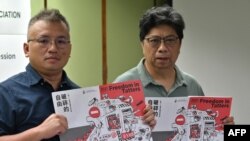For over 50 years the Hong Kong Journalists Association has promoted and protected media rights, but now the organization says it is under a “thunderstorm” of pressure.
Members of Hong Kong’s government and police, and at least one pro-Beijing newspaper, have accused the HKJA this month of being biased toward pro-democracy papers, recruiting students as journalists, and failing to acknowledge claims that its members obstructed police during protests.
Ronson Chan, chair of HKJA, believes the criticism is part of an effort to force the association to close.
“I would say they are trying to add some pressure to us, maybe they hope to see we may disband as well as other community groups. We won’t,” Chan said.
Run by working journalists in the city and with more than 500 members, the HKJA acts as a trade union for media workers with a mission to enhance press freedom and improve professional standards. The independent group is an affiliate of the International Federation of Journalists.
But since Hong Kong’s national security law was passed in 2020, the city’s media freedom has come into question.
In its annual report, published in July, the association found that “freedoms have seriously deteriorated” and risks for journalists have increased.
The report cited media arrests and the closure of pro-democracy newspaper Apple Daily, as well as changes at public broadcaster Radio Television Hong Kong that prompted the cancellation of shows amid allegations of bias, and the nonrenewal of some contracts.
Now, says Chan, the HKJA is in a “thunderstorm” of pressure itself.
In an interview with the pro-Beijing Chinese-language outlet Ta Kung Pao this month, Hong Kong’s Secretary for Security Chris Tang accused the journalists association of having biased views and favoring pro-democracy news organizations.
Tang said the association’s membership includes a large number of student journalists. He accused HKJA of influencing young reporters and promoting the concept that “everybody can be a journalist,” even 13-year-olds.
His comments appeared to be in reference to a case in May 2020 when a 13-year-old, who was volunteering with a news outlet, was detained during anti-government protests in Hong Kong.
HKJA’s Chan told VOA the accusations aren’t new, and called Tang’s comments “illogical.”
He denied that the detained teenager was a member of the association and said journalism students account for “less than 60” of its members.
Media concerns
Tang was not the only official to make claims against the group this month.
During an event at a police college, Hong Kong’s police commissioner Raymond Siu Chak-yee echoed accusations that HKJA is biased toward certain sectors of the media, and Wen Wei Po, a pro-Beijing paper based in the city, criticized the group for being anti-government.
In an interview with VOA, pro-Beijing lawmaker Holden Chow said the HKJA “turned a blind eye” to accusations that its members obstructed police during the 2019 anti-government protests.
“There were so-called journalists on the spot assisting the illegal protests, blocking police operations, and some even harassed female police officers,” Chow said.
“We wonder whether HKJA is still a professional body,” Chow added in a text message to VOA.
Accusations that journalists blocked or obstructed police during operations in 2019 are unsubstantiated, said Chan, who is also a senior editor at pro-democracy news site Stand News.
“Such accusations are being repeated and repeated. They don’t have any real evidence the accusations are valid,” he said.
Under Hong Kong’s Basic Law, freedom of the press is guaranteed. But with the national security law able to override the city’s local laws, the HKJA has concerns as to whether this can be maintained.
Lawmaker Chow downplayed those concerns.
“As long as media don't cross the line to endanger national security, I don’t think they need to worry about any loss of freedom of press, as falsely accused by some people,” Chow said.
Hong Kong currently sits in 80th place in the Reporters Without Borders Press Freedom ranking, with the media watchdog saying the new law is “especially dangerous for journalists.”
International group Human Rights Watch has said the national security law is erasing Hong Kong's freedoms.
Media analysts told VOA earlier this year that the climate for journalism overall has chilled since the law was introduced.
As fear of retaliation under the new law grows, more people are becoming wary of speaking with international media.
But speaking at an event at Hong Kong’s Foreign Correspondents Club this week, pro-Beijing lawmaker Regina Ip Lau Suk-yee echoed Chow’s statement, saying that freedom of speech is “alive and well.”
The former secretary of security pointed to pro-democracy news websites such as Stand News as an example that freedom of expression exists.
But when asked whether the Hong Kong Journalists Association would be able to carry on, Ip’s answer was less clear, saying only that it “depends on evidence.”
Chan insists the HKJA is not acting unlawfully.
“It is important for Hong Kong that we have (the association); we protect journalists who are willing to tell the truth,” Chan said.
“We are just doing the job, safeguarding the free press and safeguarding the rights of the journalists,” he said, adding that media freedom and rights are not a crime under either the national security law or local Hong Kong law.
Chan acknowledged that there have been some unofficial discussions about what to do if the pressure increases but said the association is committed to its mission.
“I still have confidence we will remain within safety and the (HKJA) will still exist,” he said.
Editor’s Note: The author of this report is a member of the Hong Kong Journalists Association.




